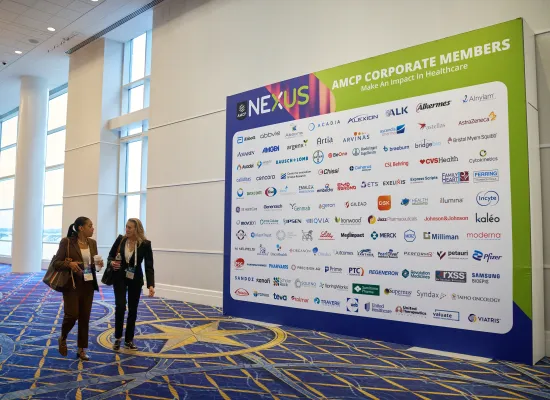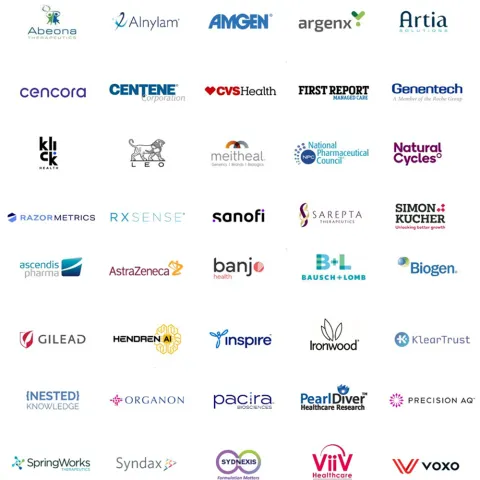
Thousands of Managed Care Professionals Address Complex Issues at AMCP Annual 2025
Thousands of managed care pharmacy professionals from health plans, PBMs, pharmaceutical manufacturers, and other managed care organizations convened in Houston, Texas, from March 31–April 3 for AMCP 2025, the industry’s premier conference. Attendees connected with peers from across the diverse roles of managed care, discussed the key trends impacting their work, and expanded their perspectives through industry-leading education sessions featuring resources from AMCP Learn, AMCP Foundation, the AMCP Research Institute (ARI), and the Biologics & Biosimilars Collective Intelligence Consortium (BBCIC).
I am always so thrilled when we can gather together. These meetings are incredible opportunities to learn—to discover cutting-edge developments in the field of managed care pharmacy and to see how they are shaping this next era in our industry.
- AMCP CEO, Susan Cantrell, MHL, RPh, CAE
The event featured speakers from across all areas of managed care pharmacy, as well as an insightful outside perspective from former Amazon Chief Medical Officer Dr. Vin Gupta in a keynote address. He spoke of the rapidly shifting health care landscape—driven by policy, innovation, and technology—and how managed care organizations can proactively adapt. His message for stakeholders was clear: “Do more with less.”
Professionals who demonstrate excellence in the field of managed care were honored with individual AMCP Awards, and AMCP Foundation’s Steven G. Avey Award and Best Poster Award recipients rounded out our honorees. Learn more about all of this year’s outstanding winners shaping the present and future of managed care pharmacy here.
Attendees had the opportunity to network with dozens of exhibitors showcasing cutting-edge products aimed at enhancing patient outcomes, alongside more than 300 research posters highlighting the latest industry advancements. These were complemented by Spotlight Sessions, Satellite Symposia, and Poster Tours, offering valuable insights into emerging trends and clinical developments including artificial intelligence, GLP-1 therapies, and the evolving policy landscape at both state and federal levels.
Three weeks out from AMCP 2025, we still feel the energy and enthusiasm from the AMCP members and stakeholders in attendance, excited to keep working on the issues on our agenda and eager to learn more about emerging trends just underway. To close things out for now, here’s a quick rundown of the key takeaways we heard from participants at our conference. Miss a session? They are now available on AMCP Learn.
Top 10 Takeaways from AMCP 2025 Sessions
- There is an opportunity for payers and pharmaceutical companies to implement meaningful outcomes-based or warranty contracts to manage uncertainty surrounding drugs approved through accelerated pathways. These strategies can help ensure value and accountability as more therapies enter the market with limited clinical data.
- GLP-1s, originally indicated for diabetes and obesity, are now being studied in a range of other conditions including alcohol use disorder, Alzheimer’s disease, NASH/MASH, polycystic ovarian syndrome, sleep apnea, heart failure in obesity, chronic kidney disease, and binge eating disorder. This expanding evidence base suggests broader implications for coverage and utilization management in the future.
- To navigate emerging trends, managed care organizations are encouraged to evaluate their preparedness by asking key questions: How is the organization preparing for this trend? How can AMCP support these efforts through advocacy and policy? And what educational tools or training are needed to equip professionals for what's ahead?
- Generics for raltegravir, eslicarbazepine, and eltrombopag are expected to launch in 2025. Since 2015, 20 branded biologic molecules have had at least one biosimilar approved, totaling 67 unique biosimilars over the past decade—demonstrating a robust and growing biosimilars pipeline.
- Legislation impacting the site of care includes restrictions on mail-order mandates (brown and white bagging), anti-steering statutes, coverage period limitations for prior authorization, and “Gold Card” exemptions. These policies play a critical role in where and how patients receive their medications.
- Key provisions in federal PBM reform proposals include a spread pricing ban, Medicare Part D delinking, and increased transparency in the commercial market. These efforts aim to enhance accountability and reduce prescription drug costs for patients and payers alike.
- CMS now requires the inclusion of patient representatives on Medicaid Advisory Committees and Pharmacy & Therapeutics Committees by 2025 and 2026, respectively. Integrating patients into coverage decisions involves clarifying their role, making use of existing engagement opportunities, supporting constructive dialogue, and building sustainable infrastructure for patient-centered input.
- While real-world evidence is gaining influence in healthcare decision-making, it is not yet widely adopted by U.S. payers. At the same time, FDA’s expedited approval pathways have led to reduced clinical rigor at launch, reflected in fewer pivotal studies, more surrogate endpoints, and an increase in single-arm trials—heightening uncertainty around new drug performance.
- In 2024, oncology saw 70 new FDA-approved indications and 24 new-to-market drugs, with over half requiring biomarker testing. However, 90% of national payers report difficulty comparing therapies, and 62% cite the complexity of oncology populations as a challenge. Cancer costs continue to climb—from $5,000 annually in 2003 to more than $440,000 per patient in 2024—fueling projections of $180 billion in U.S. oncology spending by 2028.
- By December 2024, the pharmaceutical industry had seen 77 new product launches. Key areas to watch include therapies for MASH, innovations in respiratory vaccines, the rollout of Humira (adalimumab) biosimilars, and emerging GLP-1 applications, particularly for sleep apnea.
AMCP extends our sincere thanks to the sponsors of AMCP 2025. Your partnership helped make this event possible and supports our ongoing efforts to advance the field of managed care pharmacy. We appreciate your continued commitment to the profession and to fostering meaningful engagement across the health care community.

Following the success of AMCP 2025, AMCP members and others working in managed care pharmacy are now looking forward towards Nexus 2025, which will be held in Gaylord National Harbor, Oct. 27–30, 2025.
Sponsorship and exhibiting opportunities are already available, and registration opens on June 24, 2025, for AMCP members and June 25, 2025, for the general public. Join AMCP to save up to $400 on conference registration—or students can save more than $1,000 off the full, non-member registration! Plus, mark your calendar for the Pharmacy Policy Summit on Oct. 27, 2025, where leaders will shape policy to advance managed care pharmacy and improve patient outcomes.
View the full AMCP 2025 photo album on Facebook.
If you would like to be notified when registration for Nexus 2025 goes live, stay in the loop!
Jack Goldberg
Manager, Communications and Community
Published on April 29, 2025
Featured News & Resources
See Full CalendarAMCP Southwest Day of Education
Award Applications Open
Upcoming Events
AMCP offers a wide variety of educational opportunities, from events and webinars to online training.







